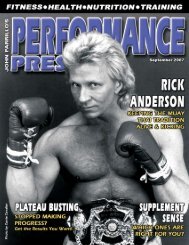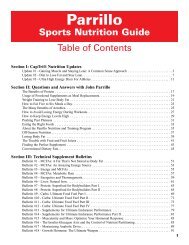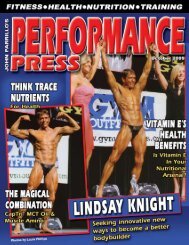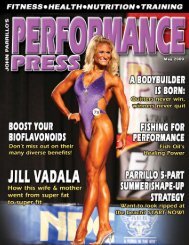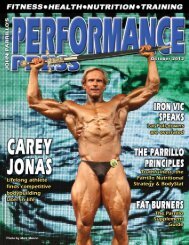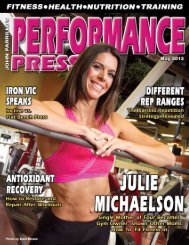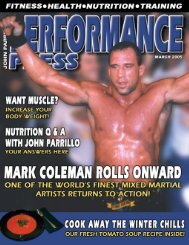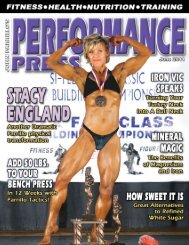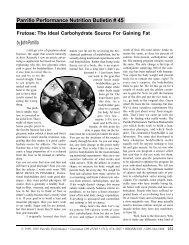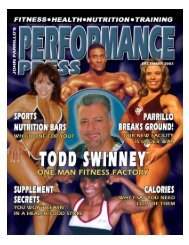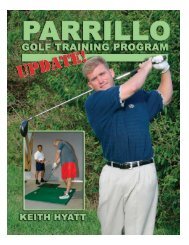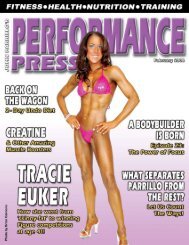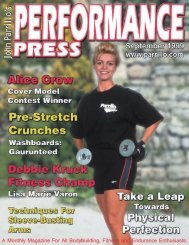John Parrillo's - Parrillo Performance
John Parrillo's - Parrillo Performance
John Parrillo's - Parrillo Performance
Create successful ePaper yourself
Turn your PDF publications into a flip-book with our unique Google optimized e-Paper software.
Rest to Grow<br />
Protein plays a vital role in<br />
recovery by providing essential<br />
amino acids and other nutrients.<br />
<strong>Parrillo</strong> Optimized<br />
Whey is of the highest quality<br />
available.<br />
it very hard. Others get better results by training<br />
a particular muscle two or in some instances even<br />
three times a week. One key factor is your strength<br />
level. As you get stronger and lift heavier weights<br />
it takes longer to recover. Many experienced bodybuilders<br />
like to train each muscle group once a<br />
week for this reason. Beginners do much better<br />
by training each muscle two or three times weekly.<br />
After all, a man who bench presses 500 for reps<br />
and does forced reps and negatives will need a<br />
lot longer to recover than a rookie handling 100x5<br />
in the same exercise. Like most everything about<br />
training, variation is the name of the game. You<br />
could develop a two-day a week routine, a threeday<br />
routine, or a six-day routine. Variety is the<br />
spice of life and the way we keep progressing.<br />
Sameness equates to stagnation.<br />
The question is often asked of me, when should<br />
I take a day off? What is the strategy behind rest<br />
and recuperation? What is the relationship between<br />
exercise, nutrition, rest and muscle growth?<br />
Generalizations are dangerous since everyone is<br />
different and circumstances are never the same.<br />
In addition to weight training, a <strong>Parrillo</strong>-trained<br />
bodybuilder needs to do aerobics on a regular<br />
and systematic basis. Pre-contest bodybuilders<br />
will do aerobics twice a day in addition to regular<br />
weight training. This is a lot of work, particularly<br />
since we insist the athlete train intensely whatever<br />
the discipline. Our rule of thumb is that you<br />
should take off the least amount of days you need<br />
in order to recuperate. If you are eating properly<br />
and plentifully and getting plenty of sleep at night<br />
you can train harder, longer, heavier and more<br />
often.<br />
You hear a lot of talk on how to avoid overtraining<br />
but often this is an excuse for laziness.<br />
Over training can be avoided if you<br />
take in lots of quality calories and get plenty<br />
of deep, restful sleep. In fact, at <strong>Parrillo</strong>, if<br />
an athlete thinks they are overtraining we<br />
advise that they up their calories rather than<br />
cut back on the weight training or aerobic<br />
activity. It is tough to make progress by<br />
exercising less. If you are not making good<br />
gains and feel zapped and tired, try increasing<br />
your calories and adding another hour<br />
of sleep to your nightly allotment. Make<br />
sure you are training intensely enough to<br />
stimulate growth. What is intense enough?<br />
Pushing the envelope and upping poundage<br />
or weights every session. Push hard<br />
and make gains, then refuel and rest.<br />
Another key recovery factor is the characteristic<br />
of the muscle itself. Large muscles<br />
need more time to recover between workouts.<br />
Because big muscles are stronger you<br />
can lift more poundage and are subjected<br />
to greater stress you need longer to recover.<br />
You might find that your arms recover faster<br />
than your legs, for example. Or your triceps<br />
recover quicker than your lower back. Be<br />
aware of these muscular phenomena when<br />
scheduling your sessions. Always try to<br />
get enough sleep. If you are unable to sleep<br />
optimally your recovery will suffer and you<br />
won’t be able to train each muscle group as<br />
frequently. Stress can be a definite detriment<br />
to recovery. Emotional stress is a very<br />
real factor as is illness. During stress your<br />
body produces cortisol, which helps you<br />
through the stress but has the unfortunate<br />
side effect of breaking down muscle. Cortisol<br />
is a catabolic hormone that breaks down<br />
muscle tissue so that the protein can be<br />
used as fuel. Illness reduces your ability<br />
to recover as your body devotes its energy<br />
to fighting the sickness rather than repairing<br />
muscle tissue. If you have a cold and<br />
don’t feel too bad, then go ahead and train.<br />
But if you have a fever or are too sick to<br />
work take a few days off from the gym.



